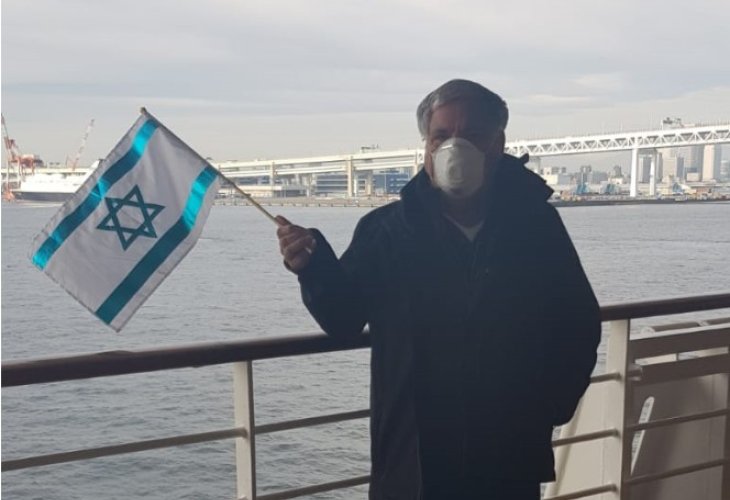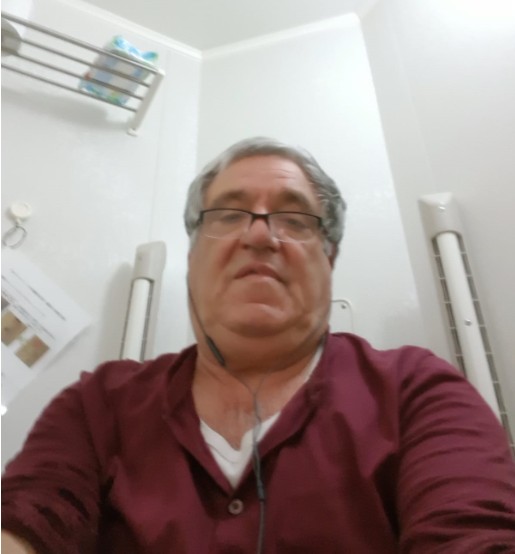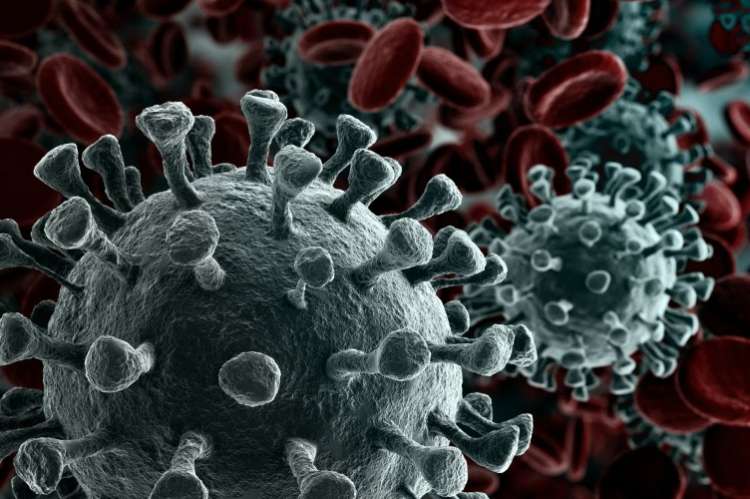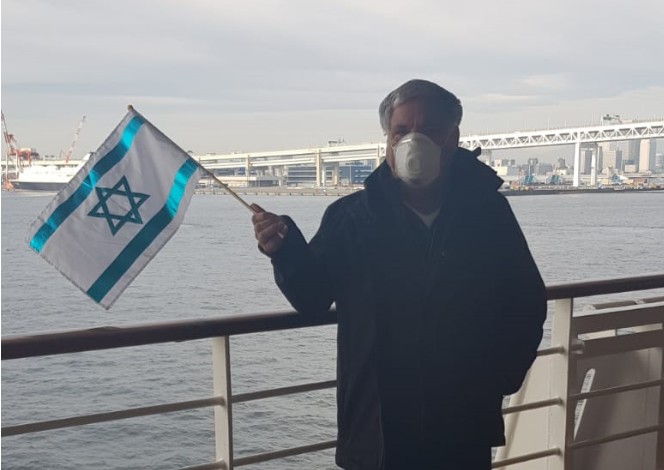Israeli Passenger in Hospital Interview: "Suddenly, I Was Told: 'You've Gotten COVID-19, You're Staying in Japan'"
"We were confined in our cabin for 23 hours a day, with only one hour to get some fresh air on the deck," say Israeli passengers from the 'Corona Ship.' Shimon Biton, infected and in a hospital in Japan, says: "They are treating me well, but I miss home." Chilling documentation.
 Shimon Biton
Shimon BitonEven in their worst nightmares, members of the Israeli group who boarded the cruise ship 'Diamond Princess' did not imagine what awaited them during the cruise, which was just a part of a birthday celebration for two family members.
The family's first indication that something was wrong came at 2:00 AM (Israel time). "We received a phone call informing us that there is a concern one of the passengers has contracted the coronavirus, and therefore, the ship's passengers will be quarantined," says Eliav Levy, whose mother Bruria and sister Nicole Ben David were aboard the 'Diamond Princess,' some of whose passengers were infected with the virus. "At first, we treated it as a temporary delay and weren't worried," Levy says. "But that feeling soon changed," he adds. As time went by, anxiety grew among family members back home. "Initially, we were told about one passenger who contracted the virus, but every day we heard reports of more and more infections from this deadly virus." At the same time, reports from around the world told of people dying after contracting the virus, which only intensified the family's concern.
 Shimon Biton
Shimon Biton
Isolated on the Ship
The coronavirus, or its official name, COVID-19, was initially found in citizens who ate bats infected with the virus. Since then, the pandemic has refused to wane, continuing to plague the entire world. So far, 2,128 people have died, with over 75,700 confirmed cases of coronavirus infections.
Amidst global panic over the coronavirus, passengers on the 'Diamond Princess' found themselves suspected of carrying the disease. The ship had 3,711 passengers when Japanese authorities were notified that a passenger who disembarked in Hong Kong had tested positive for the virus. From that point, the ship's passengers remained isolated, full of fear.
The grim news hit the ship's passengers on the 9th of Shvat (February 4th), when health inspectors in Japan discovered that 10 passengers had contracted the virus. It became clear to the passengers that the person who disembarked in Hong Kong and was thought to have caused the outbreak was not the only infected passenger. Fear spread among the passengers. The test results led Japanese authorities to impose strict isolation measures on the ship, with passengers instructed to take precautions until they leave the ship after approximately two and a half weeks. Meanwhile, the ship was allowed to dock at Yokohama Port for continued monitoring and passenger isolation.
Two days later, 10 more passengers were found to be infected. The following day, the virus infection tally jumped to 61, causing passengers and their families back home to fear the worst, as Eliav Levy tells 'Hidabroot.'
Shimon Dahan, one of the ten Israelis aboard the infected ship, gives an exclusive interview to 'Hidabroot' from Japan's central military hospital, describing the moment he learned that his ship was suspected of harboring the deadly virus.
 (Photo: shutterstock)
(Photo: shutterstock)"Eight hours before departing the ship, we learned that the passengers were suspected of carrying the coronavirus. It was terrifying, and only faith kept us going. I always tell my children and those around me that everything is from above. We can plan and organize, but at the moment of truth—only Hashem runs the world, and He will decide."
After some delay, the Japanese authorities changed their minds and agreed that the ship could dock in Yokohama. However, they stated clearly that no one could disembark. The mandate was that all passengers must stay confined to their cabins.
The passengers were nearing the end of a 15-day cruise. Now they were told to stay on board for an additional 14 days. Conditions worsened abruptly. From an enjoyable cruise full of activities, the experience turned into a difficult and challenging stay.
From that moment, the daily routine of the ship's passengers, including the Israeli passengers, changed entirely. "We were in isolation for 23 out of 24 hours, my wife and I alone in the cabin," says Shimon. During one hour a day, passengers could breath some fresh air on the deck.
What did you do during those long hours?
"I kept myself busy in various ways. I was reporting to all media outlets about our situation and maintained constant contact with many journalists. I was even interviewed by a Jewish magazine in the USA called 'Ami,' which translated my words for its readers. Additionally, I was occupied with phone calls from my dear family members waiting for us back home. Above all, I spent hours listening to Torah lessons by Rabbi Zamir Cohen. It helped me pass the time and stay upbeat. I love listening to him."
However, while the USA sent planes to bring American citizens back home, Israeli passengers found themselves without support, claiming they were left exposed to the harsh virus. Their criticism was echoed by a Japanese expert who boarded the ship, noting that it was no wonder so many passengers contracted the virus. According to him, the ship's conditions were unsuitable for optimal quarantine.
In conversation with 'Hidabroot,' passengers' family members expressed their disappointment with the authorities' actions. They claim that no official approached them during the first three to four days. They assert that officials only began to take notice after the "noise we started to make. Only then did they start paying attention to us."
Despite these critiques aimed at the State of Israel, family members emphasize the Jewish mutual responsibility they encountered throughout. Among others, they highlight Chabad's emissary in Japan, Rabbi Benjamin Edrei, who helped the passengers as much as possible, from providing food to psychological support. The support from the Chabad house in Tokyo astonished Levy. "It was nonstop assistance, and throughout the days and nights that the passengers spent on the ship, Chabad emissaries were there for them and us," he says. He also mentions the Tehillim reading project for protecting family members on the ship and boosting their mental and moral state, which greatly benefited them.
After two and a half weeks in quarantine, the Israeli ship passengers disembarked, except for four passengers who contracted the virus and were in mild condition. To the sounds of 'Am Yisrael Chai,' the rest boarded a bus to the plane and continued their journey back to Israel.
 Shimon Biton
Shimon Biton
Shimon Biton: "Then I Found Out I Was Infected"
Continuing our conversation with Shimon Biton, he mentions that throughout the isolation period, he felt well and did not exhibit any COVID-like symptoms. He had no fever and did not feel fatigued or dizzy.
Yet, during the final tests conducted on the ship's passengers after the isolation period ended, Shimon discovered he had contracted the coronavirus. He describes receiving the news as "a five-kilo hammer" suddenly falling on his head. "We were preparing for the final disembarkation," he recalls, "when there was a knock on the door. I went to open it and saw two people dressed from head to toe in special protective gear. I needed no further explanation. I immediately understood the meaning. My wife burst into tears and wanted to stay with me, but I told her to return home. I was a soldier, and I know how to handle situations like these."
From there, Shimon was rushed to the main military hospital in Japan. He describes the place as particularly inviting and comfortable, adding that even now, he feels well, just as he always did.
Are you undergoing treatments?
"No, just daily tests." Like other infected patients, Shimon undergoes three daily tests to monitor his blood pressure, pulse, and temperature. After a series of three consecutive tests, conducted every two days, confirming the individual is clear, they are considered healthy and can leave.
A special professor was sent from Israel to visit the Israelis infected with the coronavirus. He stayed with the patients over the last Shabbat.
Despite feeling good and having no fever, Shimon experienced a minor complication when he developed a mild inflammation during his stay. "While antibiotics are common in Israel, the Japanese refrain from using them," Shimon tells us, adding that it is a minor issue that presents no concern. Israeli contacts with Shimon and others infected explained, "These are the Japanese protocols, and they must be followed."
How do you communicate with the medical staff?
"There's not much contact with them, as they don't speak English. Our communication is via a translator device—when they speak English, their words are translated into Hebrew."
As mentioned, Shimon remains at the Japanese hospital, longing to return home. The hospital situation is even more challenging than what he got accustomed to on the ship, where he had an hour each day to go on deck, wander a bit in an open space, and breathe fresh air. Now, that privilege is gone, and he remains in the same place for 24 hours.
Meanwhile, during his hospital stay, Shimon continues to manage his affairs from afar. "I work at Tabor Winery," he shares. "I've been there for 38 years. Even though it's time for retirement, I remain in my role as the winery's operations manager. So I take calls and manage things remotely as much as possible."
To the question of how he holds on during difficult times, he answers, "Something from above sustains me. I'm optimistic and always focus on the half-full glass. Getting depressed won't do any good, neither for me nor for the children."
Shimon also emerges as a source of strength and faith for his family, to the point where family members ask him where he has been all these years. "We thought you were silent," they joke, while he responds that this experience is a chance to reveal his strengths and sanctify Hashem's name in a foreign place, displaying exemplary behavior as a son of the Jewish people to the world.

